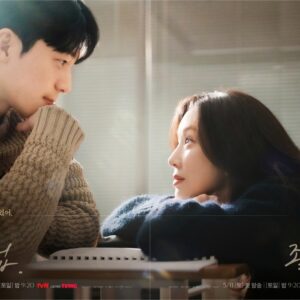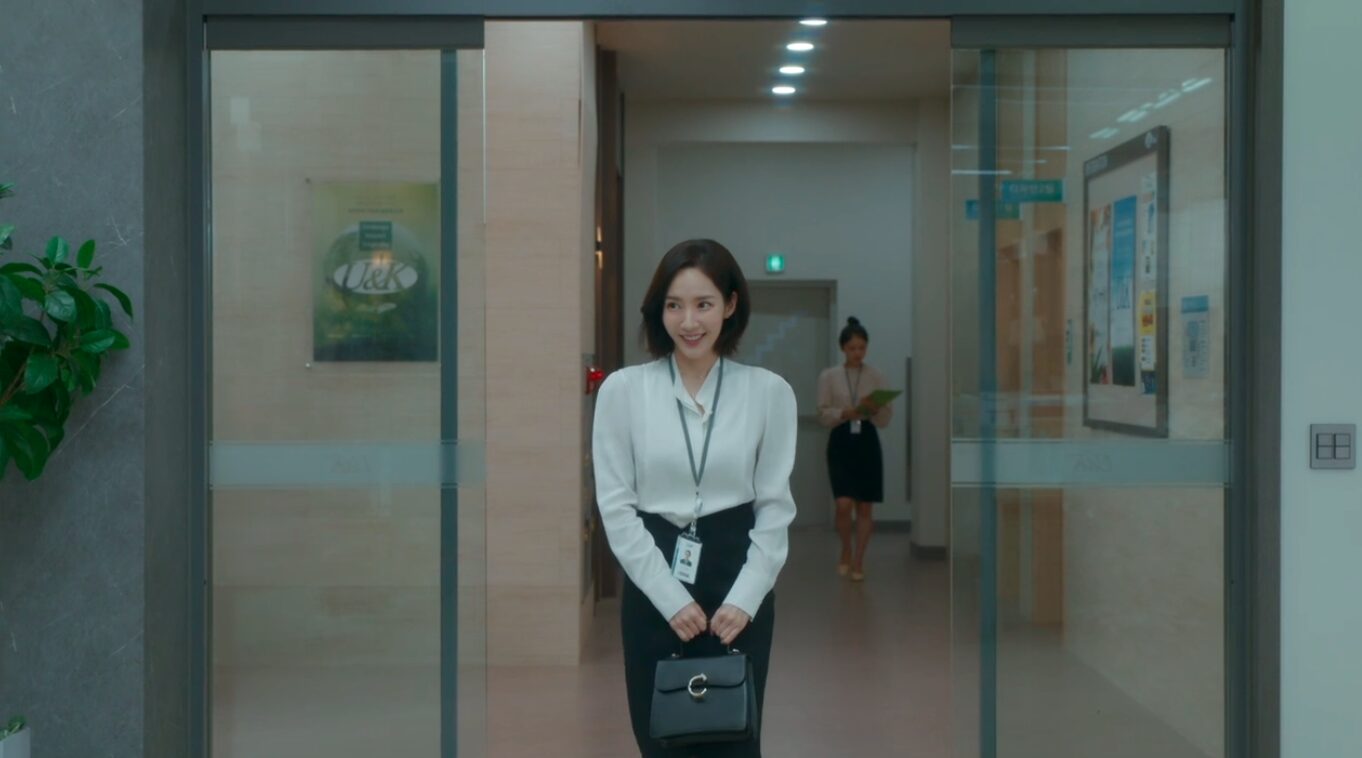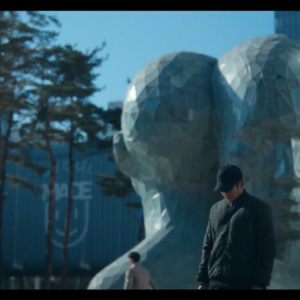Is Korea’s latest Weekender secretly the most subversive of its genre? I discuss Beauty and Mr Romantic and whether the show is quietly skewering some of Kdrama’s most beloved romance tropes
A handsome Chaebol bumps into a beautiful actor in the street. As he stands there, she spins him around to save him from falling boxes. He stares adoringly after her as she leaves. She saved his life! He’s found his destiny!
This is the meet cute that underpins the relationship between Chaebol second son, Gong Jin-dan and A-list actress, Park Do-ra. She’s clawed her way out of poverty with hard work, talent and the questionable antics of her exploitative mother. He’s the overlooked second son of a mistress who’s treated poorly by the main branch of the family and is looking to find true love.
And thus a Kdrama romance plotline is born.
Or not.
Because this meet cute is not the beginning of Beauty and Mr Romantic‘s main romance. It is instead the meeting of the female lead with the second male lead. A story of violence, abuse, bullying and coercive control. And not in a romanticised way like the misleadingly-titled Chinese drama, Well Intended Love. No, we’re never supposed to ship this. But we are supposed to be fooled by it. At least at first.
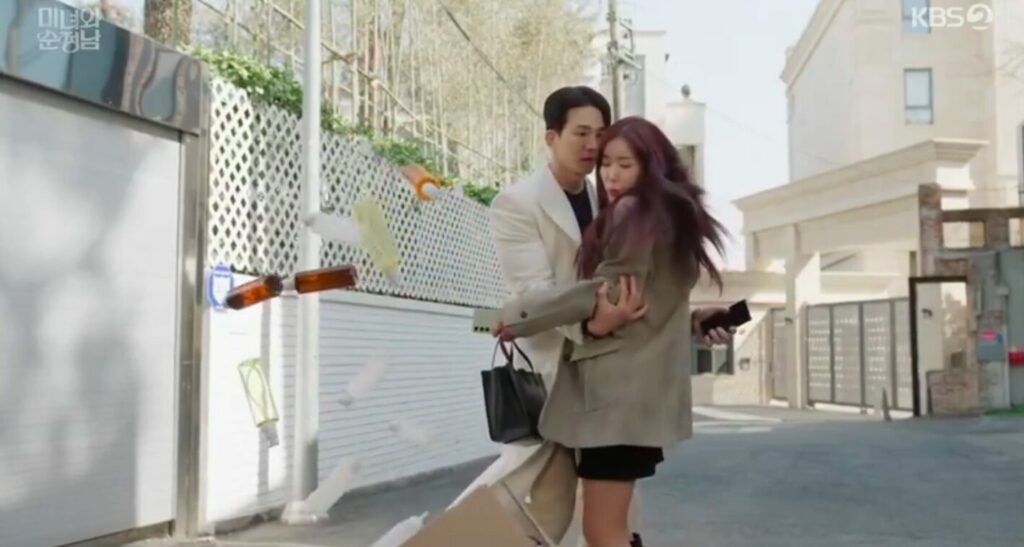
Beauty and Mr Romantic is the latest Weekender out of Korea. Before it started, the title and the promotional posts implied that it was based on Beauty and the Beast. At the halfway point, I’m here to argue that the show is definitely based on the fairytale. But the question of who precisely is the Beast in this story, has led to me to suspect that Beauty and Mr Romantic is a secretly subversive indictment of exactly the kind of romance tropes that Korean dramas usually promote. And, while the halfway mark might be too early to say for sure, I’m starting to think this may be the most subversive Weekender I’ve ever seen.
What is a Weekender?
If you’re new to Kdramas, you’re probably wondering what a Weekender is. While there are many kinds of Kdramas, they can be broadly placed into three categories: Dailies, weekenders and weekday dramas.
Dailies are long-form dramas that usually air upwards of a hundred episodes (sometimes over 200) and air an episode every day during the week. These are the most like a classic soap opera and have very low budgets and production values. Weekday dramas are the ones you’ve probably heard of and watched the most of. They usually air two episodes during the week, are often 12-20 episodes and have big stars, bigger budgets, and high production values.
Which bring us to Weekenders. Usually 50 episodes or so, weekenders are family dramas that air, well, on the weekend. They frequently look at the ups and downs of two or three families that come into each other’s orbit, sometimes over years or even decades. Often, one is rich and the other is poor. In many cases, they seem inextricably bound by fate.
Other features of a Weekender are:
- Two to three romances, often between members of the same two families
- An historical tragedy or atrocity that binds the main families together and leads to a secret of some kind (often but not limited to a birth secret)
- Corporate shenanigans of the Chaebol variety
- Found family, usually involving a guest house or a home that takes in one or two boarders
- Cultural conservatism, including the promotion of traditional Korean family values
Unofficially, what constitutes the average Weekender is misogyny and shrieking. Thus they’re sometimes seen as an acquired taste or a shameful pleasure (or sometimes both). Beauty and Mr Romantic certainly has all of this in spades (but especially the shrieking). Oh, and the misogyny. A soul-shrivelling onslaught of misogyny. But, while this nearly made me drop it early on, I now believe the misogyny is deliberate.
Because I believe that Beauty and Mr Romantic is critiquing a very specific kind of cultural misogyny rooted in neo-Confucian patriarchy. And since neo-Confucian family values usually underpin Korean dramas – and conservative Weekenders in particular – then this critique is therefore especially subversive. And all done in a way that makes it looks like a standard Weekender on the surface. (Although that last sentence sums up why I could be seeing something that simply isn’t there).
Yes I could be completely wrong. It wouldn’t be the first time. Nonetheless…
The Plot
There are three time periods in Beauty and Mr Romantic and, since a Weekender has the episodes to really tease out its characters, we get a well-developed back story before jumping ahead to the main story.
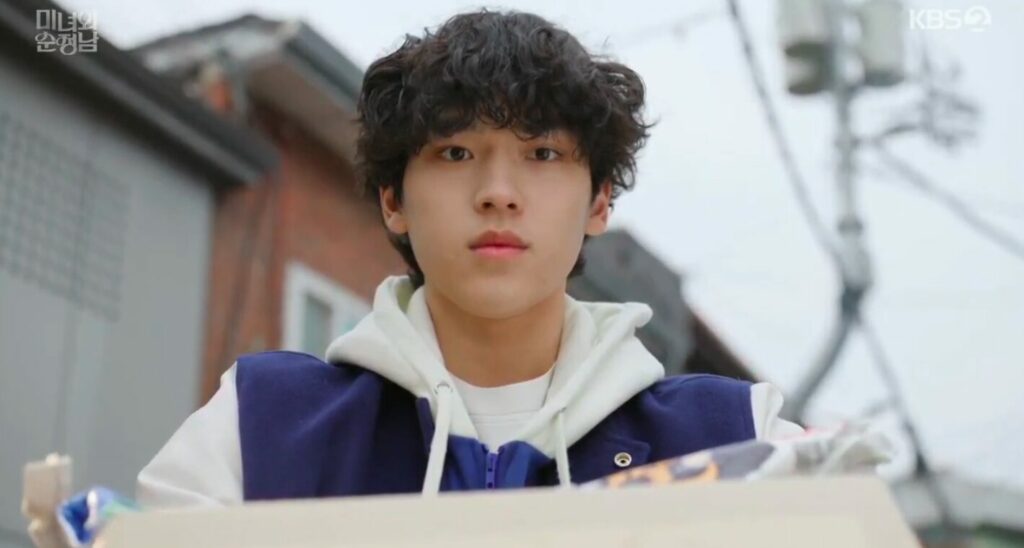
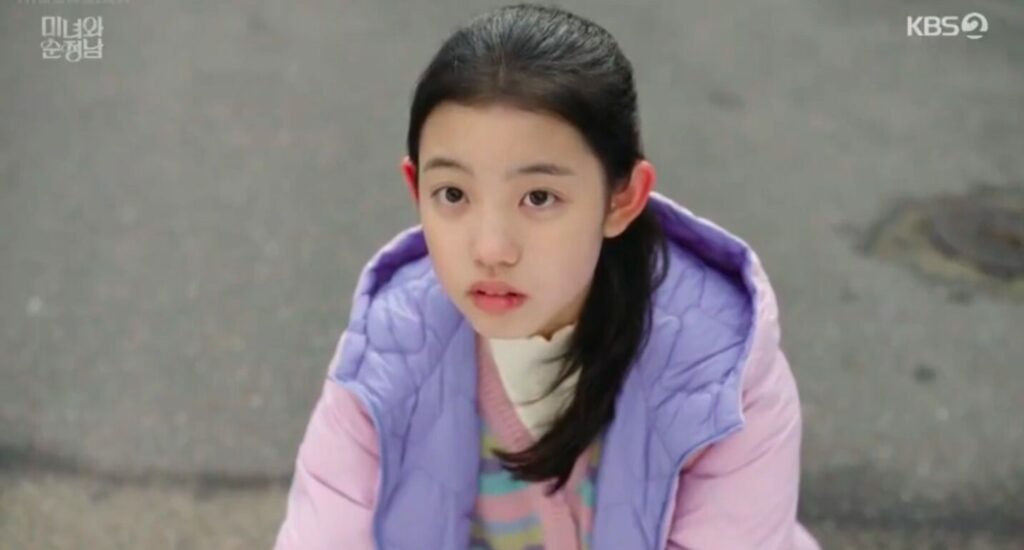
Park Do-ra (Lee Seol-A) is a middle-schooler who meets the sweet, enthusiastic and extremely silly high-schooler, Ko Dae-chung (Moon Sung-hyun) and decides that he’s her destined love. Dae-chung has the appropriate amount of interest a near-adult would have in a 12-year-old – zero – and is instead in the throes of his first love with an older hairdresser.
Dae-chung is living in a large house with his parents, unmarried Aunt, paternal Grandmother and maternal Grandfather. Unbeknownst to him, he’s not their biological son but is instead a foundling who was left on their doorstep. His real mother is his adoptive mother’s best friend, who was forced to give him up to marry a wealthy Chaebol because her family needed money.
She’s dealing with the fact that her father-in-law seduced one of her highschool friends and kept her as a mistress for many years. This union resulted in a son, Jin-dan, who is only a few years’ older than his own niece, Ma-ri. During the course of the first segment, Ma-ri has a terrible accident and ends up with brain damage that causes a developmental delay. This leaves the Chaebol family with two sons in one generation and a daughter with developmental issues in the next.
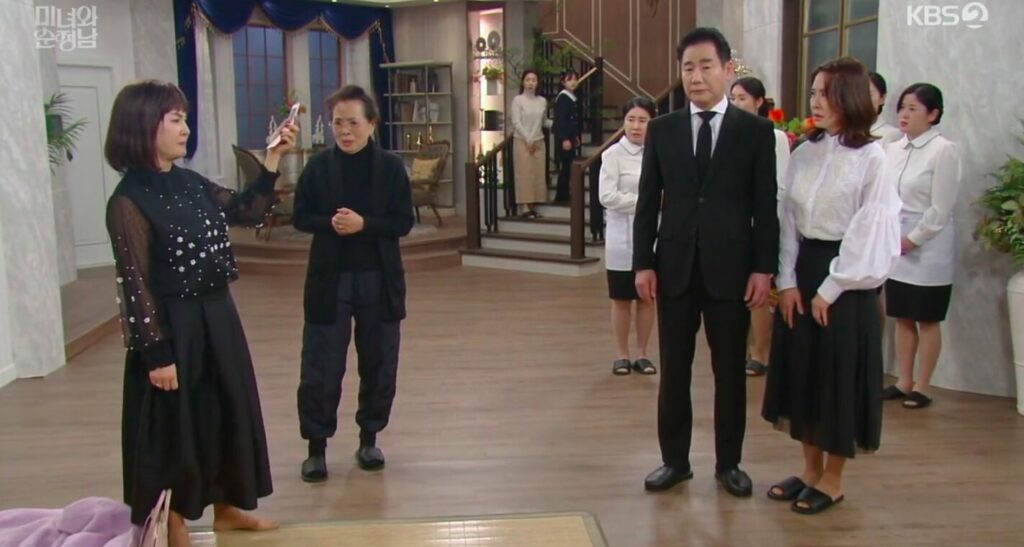
Dae-chung’s family rents out a granny flat on the property to Do-ra’s family, who are fleeing crushing debt after the death of her father. Do-ra’s mother is desperate for her to have some success as an actor as a way to lift their family out of poverty.
Do-ra’s mother has few skills, is barely coping with three children, and regularly struggles to put food on the table. She decides to flirt with the house’s grandfather in the hopes that he may pay off some of her debt for her. It works. But when she makes it clear she’s not actually interested in him, he has a heart attack and dies. The family blames her and so she packs up her family and flees.
Fifteen years later, Park Do-ra (Im Soo-hyang) is a huge star. Ko Dae-chung has changed his name to Pil-sung (Ji Hyun-woo) and is an aspiring director. They meet again on a drama set and, despite not remembering who he is, she falls for him again. At the same time, she meets Jin-dan (Go Yoon) in the meet cute that opened this post. Her pursues her aggressively; cheered on by her mother who has racked up a huge amount of secret debt and needs his wealth to cover her losses. When she rejects Jin-dan, not once but repeatedly, he destroys her life in response. She throws herself into the sea.
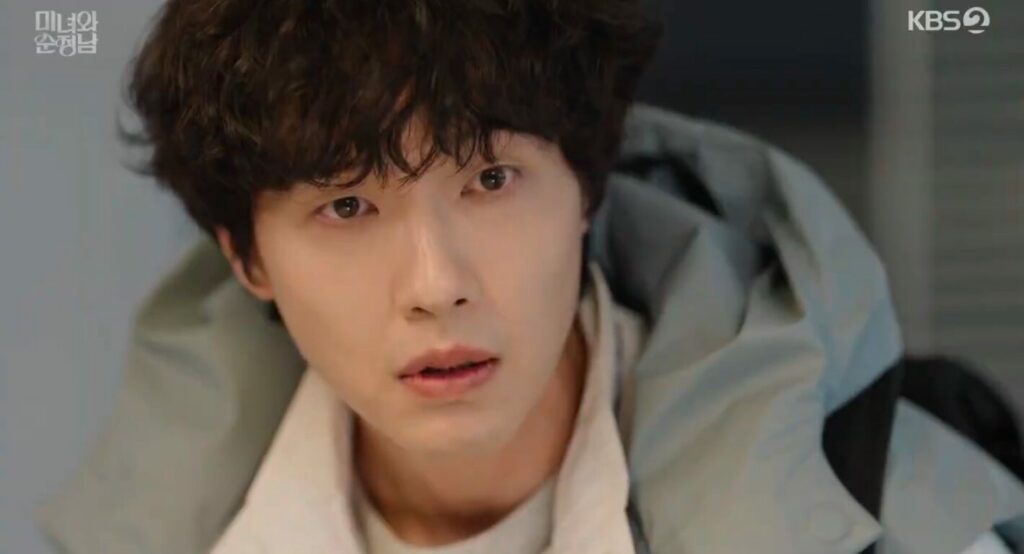
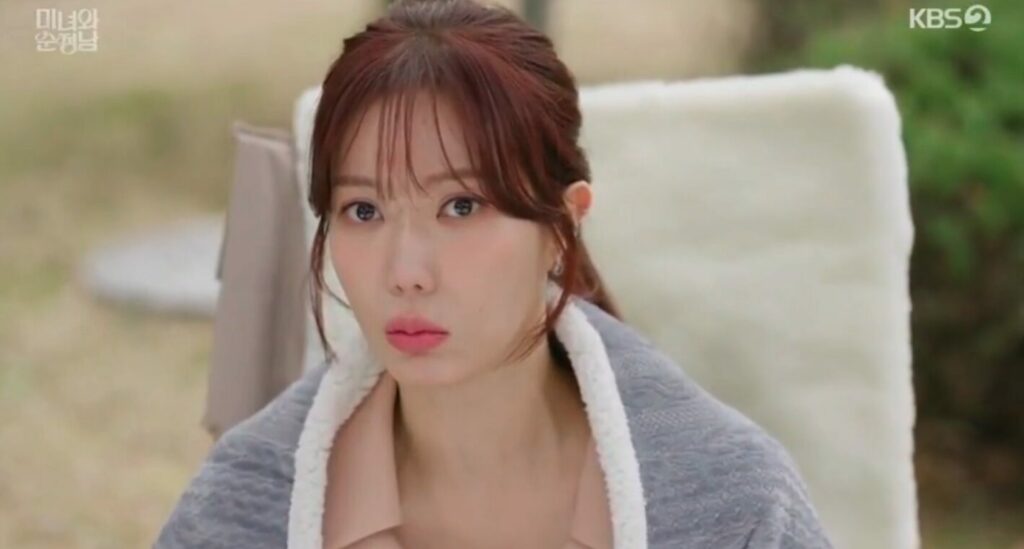
Two years later, Do-ra is living in a seaside town believing herself to be Kim Ji-young, the granddaughter of a local restauranteur with dementia. (Yes, she has amnesia. Of course she does). When Pil-sung comes by her town to film a drama, she falls almost instantly in love with both him and acting. Again. He quickly works out she’s really Do-ra but others have noticed the similarity as well. Like Jin-dan. And he’s not interested in being rejected a second time…
Beauty and the Beast
There are several versions of Beauty and the Beast, up to and including the later Disney films that inspired the promotional posters for this drama. While these stories differ in certain aspects, the core part of the tale remains.
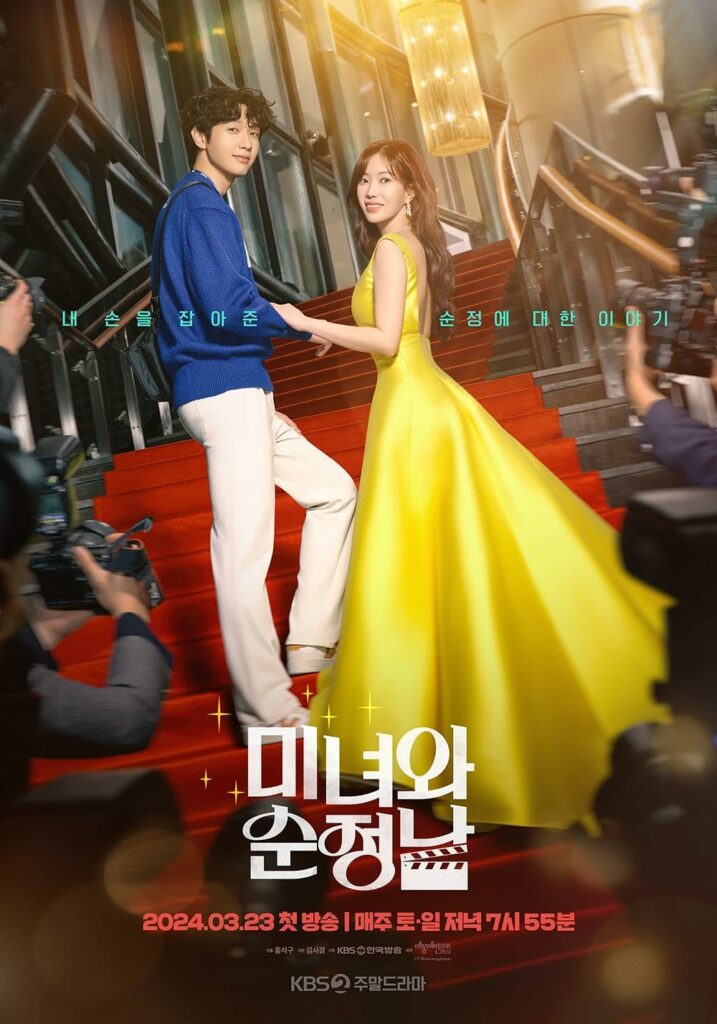
A young, beautiful woman’s family falls on hard times. Her father receives some kind of help or hospitality from a wealthy but ugly Beast and in exchange he must give him one of his daughters (in many versions she volunteers out of familial piety). While Beauty is originally repelled by his ugly visage, she eventually realises that he is sweet, kind and extremely generous. When she returns his love, he turns into a handsome Prince.
There are several ways you could interpret this fairytale. But it can be argued it’s a story about familial piety and arranged marriages. Beauty agrees to an arranged marriage to help her family with their financial woes. She is initially unhappy with the match, but by staying open and being willing to look below the surface, she finds both love and prosperity. In fact, it could be said that the tale is telling young woman that Beauty’s willingness to sacrifice herself for her family and enter into an arranged marriage with a man who scares her is noble behaviour that will be rewarded.
While the Beast in Beauty and the Beast is physically ugly, the story has also been used to tell a tale of a man with an ugly personality instead. And it’s here that the story can be seen to dovetail with classic Kdrama Candy/Chaebol romances. In this case, the beautiful, poor girl with the family to look after is able to see beneath the ugly personality flaws of the rich guy who’s pursuing her to the good man below. And is again rewarded for her nobility. Either way, Beauty ends up happily married to a very rich Prince.
Beauty and Mr Not-a-Beast
If Beauty and Mr Romantic is to some extent inspired by Beauty and the Beast, then the obvious questions becomes, “Who is the Beast?” After all, Pil-sung is not a Beast by any definition. He’s cute, nice, respectful, ordinary. His family has both assets and debt. He works hard and has an ordinary amount of success with a normal career progression. He’s older, but not by so much that it would be strange for a 28-year-old woman to be interested in him. In short, Pil-sung is just an average guy.
When the drama did its first time leap, 15 years into the future, Do-ra falls quickly for Pil-sung, even without recognising him as Dae-chung. But she also has a sweeping, romantic memorable meeting with Gong Jin-dan, the second son of APP Group. A handsome Chaebol. Enamoured of her, Jin-dan sponsors her latest drama, writes her a blank cheque and showers her with gifts in a ham fisted, but also adorably dorky, attempt to woo her. Having seen so many Kdramas – and not a few Weekenders – he seemed the textbook second male lead.
That is, until Do-ra had the audacity to turn him down.
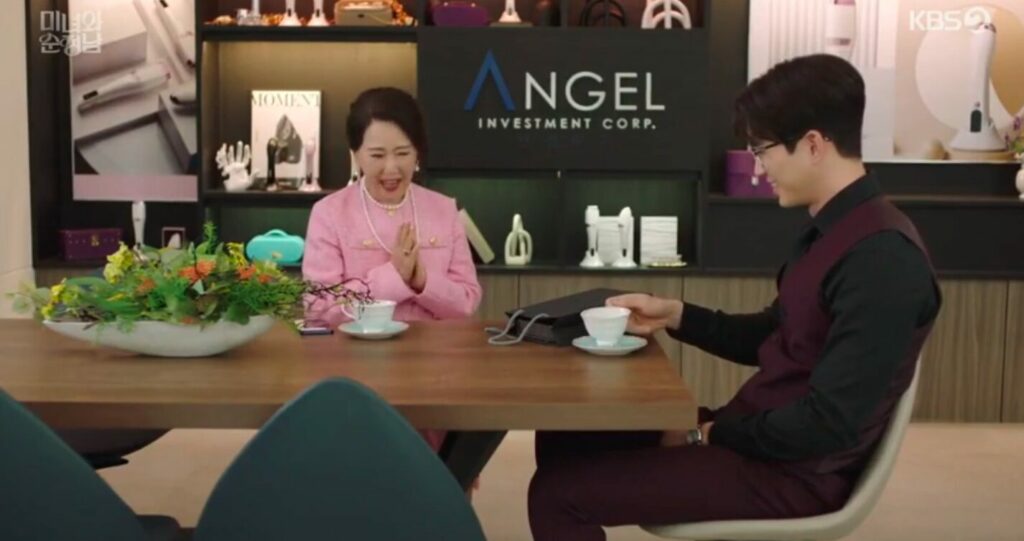
Throughout this second storyline, Do-ra’s desperate, grasping mother tries her best to manipulate, cajole and then outright force Do-ra to marry the rich guy to help her cover a spiralling debt she’s been hiding from her daughter. As Do-ra gets more and more adamant that she doesn’t want to marry Jin-dan, his behaviour becomes more and more frightening.
A spoiled, entitled narcissist with an accompanying inferiority complex, he becomes violent, controlling and outright abusive as he attempts to coerce and then bully Do-ra into marriage by turning public opinion and the industry against her. By the end, she’s utterly terrified of him but is also faced with a stark choice: marry him and bail out her family with his money or have them declare bankruptcy and slide back into poverty.
And here we finally have it – Beauty and her Beast.
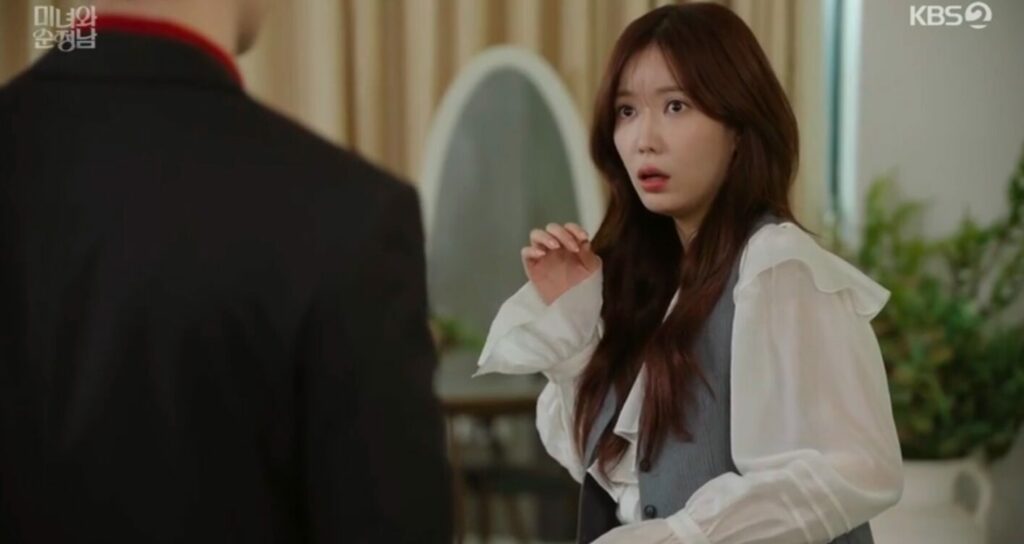
As this horrible plotline unfolded through the drama’s second time period, I was struck with how much of an inversion it was from what would usually be the standard Kdrama romantic tale. The cute meeting, the bumbling pursuit, the opposition of his family, the jealousy of an intrusive public eye, the mother pushing the match for her own selfish agenda. All of these are standard elements of a Candy/Chaebol romance. But for the first time, a Weekender seemed to be examining the potential toxicity of all these tropes. And all the while contrasting it with a main romance between Pil-sung and Do-ra that was just two people who genuinely like each other enjoying each other’s company.
I’d finally found my Beast. The rich, horrible Chaebol that Do-ra would be forced to marry to dig her family out of poverty. But he’s no handsome Prince underneath, there’s no fairy to turn him into a viable love interest. He’s just ugly through and through. Should Do-ra sacrifice her own happiness for familial piety in the hopes that a spot of magic will change this Beast into a man? The show comes strongly down against it. Beauty and the Beast is subverted.
In a way, the show’s poster and title now seem an ironic juxtaposition. This is not Beauty and the Beast, it’s saying, It’s Beauty and Mr Romantic. If there was a Beast in this, you wouldn’t really be shipping our female lead with him, would you? Well, would you?
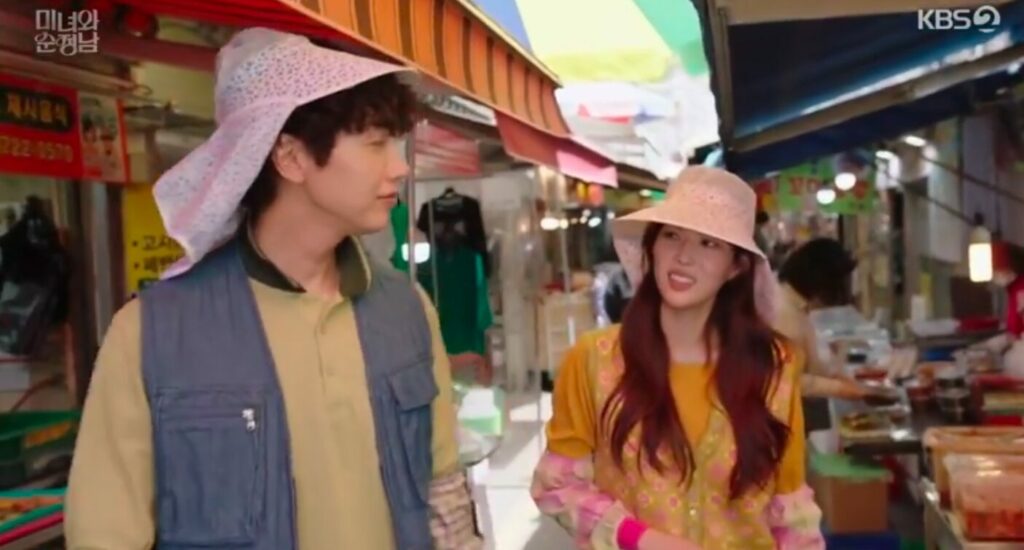
This of course opens up a broader question about the show and its treatment of its relationships. Is it possible that Beauty and Mr Romantic is doing more than just invert the romance tropes of Candy/Chaebol romances to critique the Beauty and the Beast fairytale? Could the show be doing something even more radical, even iconoclastic? Is it possible that Beauty and Mr Romantic is in fact critiquing arranged marriages as toxic and destructive? Is it possible that the show is even critiquing the underpinning misogyny of neo-Confucianist patriarchy as a whole?
(Answer: No, probably not. But a girl can overstate for emphasis now and then. It’s my blog. Also if you’re still reading this post, kudos. It wasn’t supposed to be this long. And it’s still going. Mianhe.)
The Beast of Misogyny
One things that strikes you in the first few episodes of Beauty and Mr Romantic is the sheer volume of the characters’ teeth-grinding misogyny. It permeates everything, to the point where it’s offputting. All the men are innocent victims of evil women and their money-grubbing schemes. All the women are either dutiful, filial, and quiet or they’re scheming, drunken harpies who are trying to seduce your men.
Weekenders tend to have a standard initial setup, but something about the show’s establishing premise seemed off. The large, loving family who run the boarding house and took in a foundling and raised him as their own had scenes where they were nasty, vicious and judgemental to a struggling single mother. The dysfunctional Chaebol family with the evil, scheming mistress were in fact perfectly content to pass their company onto a daughter instead of a son. The rift between Do-ra’s family and Pil-sung’s seemed insurmountable.Something was off but I couldn’t put my finger on what it was.
Halfway though, I realise this disconnect between the show’s setup and a standard Weekender is because the show consistently portrays all three families as essentially being the same, despite their differences of rank and wealth. They punch down on those below them and try to ingratiate themselves with those above them; the only thing that changes is where they are on the totem pole. And since women can only punch down on other women, they punch down on women. A lot. And universally. And it doesn’t matter if they’re rich or poor or somewhere in between.
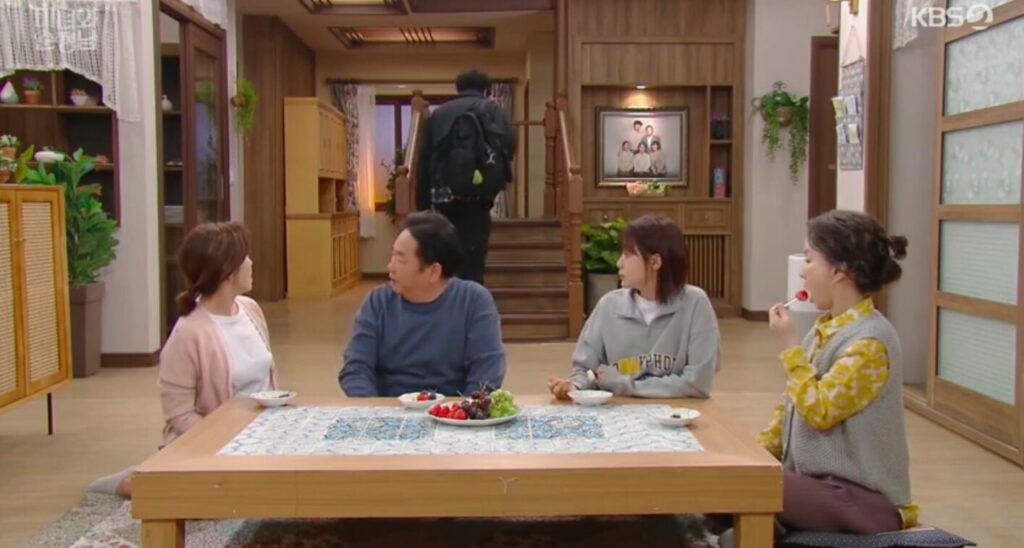
Weekenders generally portray the poor family as warm, loving and noble and the wealthy one as dysfunctional and badly-behaved. But Beauty and Mr Romantic is saying that they’re fundamentally the same. And “gold digger”, a term thrown about continually by the show, is a hugely gendered insult that at its core means that a woman in a lower social sphere has the audacity to aspire to upward mobility. That is, it’s only “gold digging” when it’s happening to you. If you do it, it isn’t.
We’re supposed to hate Jin-dan’s mother, the much-younger mistress who constantly schemes and white-ants Pil-sung’s biological mother. But her son Jin-dan’s behaviour reflects what was probably his father’s attitude towards women. He sees them as commodities to be purchased, has no issues seeing multiple women at once, and reacts angrily, even violently, if they have the audacity to attempt autonomy.
(At one point, his mother, trying to arrange a marriage for him with a wealthy family, asks, “Are you already seeing another woman,” since an affair is a normal thing for a man. But apparently a scandal for a woman.)
Since his mother was only 21 and extremely poor when she came into a wealthy older man’s house in his employ, we can guess exactly how this relationship unfolded. And yet it is she and not her lover who was condemned. Another plotline has the Aunt of Jin-dan’s older brother, the current head of the Chaebol family, trying to get rid of her nephew’s wife by proving she had a baby before she even met him – while simultaneously encouraging him to take a mistress.
The show portrays a clear generational divide between the diverse women its canvasses. The older generation are clearly wedded to traditional neo-Confucian concepts around gender roles and marriage. Women should be meek, chaste, obedient and filial to their fathers, husbands and sons. Men should be strong, wealthy and domineering. Pil-sung’s adoptive grandmother, Do-ra’s mother, and Jin-dan’s mother and great aunt all ascribe to these traditional roles and expectations.
This is reflected in their obsession with wealth, their commitment to the ascendant role of the masculine, and their terror of gold diggers (who are always female – and even, in some cases, when they’re being called “gold diggers” themselves). It doesn’t matter if they’re scraping by at the bottom or living a life of luxury at the top, the commonality of their shared traditional values unites them as one.
Do-ra’s mother and Jin-dan’s mother are two women who believed inherently in this value system. If you find a man with good money, you marry him, have his children, and he will look after you. This led Do-ra’s mother to be widowed young with three children and no skills. It lead Jin-dan’s mother to agree to be the mistress of a wealthy man in the belief that, if she bore a son, she would be looked after and respected for the rest of her life. It led Pil-sung’s biological mother to abandon her own child so she could marry a rich man to support her family’s aspirations.
All three women embody the natural end point of a belief in a traditional natural order based on patriarchal values. And all are portrayed as being fundamentally wrong. Do-ra’s mother is stuck trying to replicate and perpetuate this system with diminishing returns until she’s a horribly unsympathetic ghoul of a mother who tries to suck the life out of her daughter in the name of traditional Korean familial piety. (This value is brutally critiqued when the world finds out about Do-ra’s mother’s gambling and condemns Do-ra as an unfilial daughter not doing enough to cover her mother’s debts).
One scene further into the drama has Pil-sung’s gold-digger obsessed adoptive mother regaling her mother and sister-in-law with a scandalous tale of an evil woman who trapped a man into marriage by poking holes in his condom. They’re all united in their condemnation of her terrible behaviour. But later the mother-in-law tells her daughter that she should do the same thing. It’s not the act she has a problem with, just that it’s other woman who are doing it. If her daughter did it, it would be an understandable, even filial, act to get her family more money.
This attitude towards women and relationships also drives Jin-dan and, to a lesser degree, characters like Do-ra’s older brother, Park Do-sik. He wines and dines a 23-year-old, gives her a large diamond and then is astonished when she refuses to marry him. Jin-dan simply believes that he has what women want – money and status – and so any rejection is an humiliating insult that needs to be met with a counter strike.
By the drama’s midway point, it starts to become clear that what Do-ra is up against is not a single Beast but an entire Beastly culture that is determined to put her in some sort of cage, gilded or otherwise. While Do-ra’s beast is still, in many ways, Jin-dan, it could be argued that her real beast is neo-Confucian patriarchy itself.
And, considering the way an eager public was easily marshalled to tear her down for her supposed sexual transgressions, you could even argue that it was the Beast that killed her.
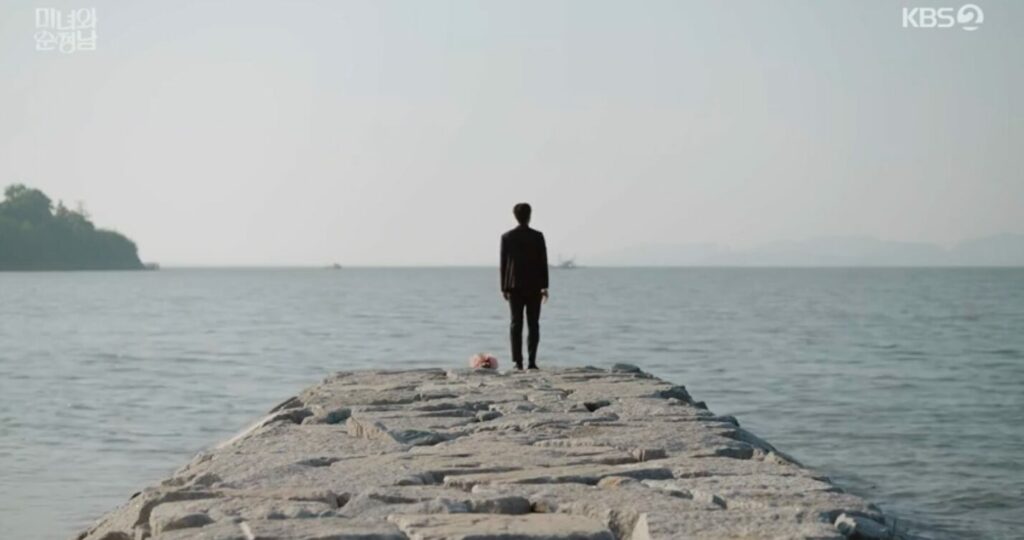
Love’s not a fairy tale
Beauty and Mr Romantic also has a more subtle thematic inversion of its fairy tale source text running through it. Do-ra is not the only woman on the show who gets a cute, romantic first meeting with a man she won’t end up with (we hope). The kind of meeting that romcoms and fairytales tell women precede the great romance of their lives.
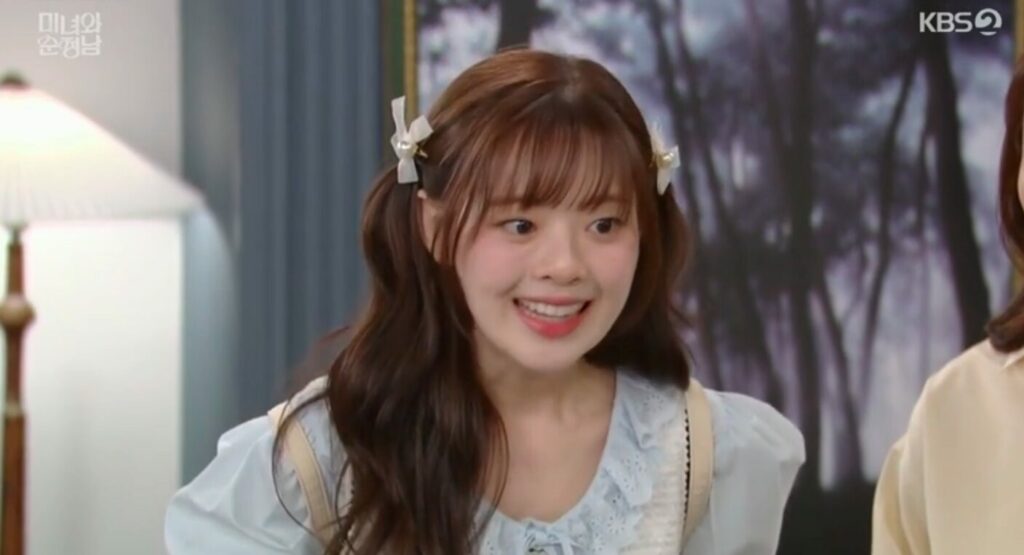
Ma-ri, the developmentally-delayed Chaebol daughter with the mental age of 12, is constantly on the lookout for her fairytale prince, dedicated as she is to her romance novels. While I have some reservations at the assumption that this character needs to be married – frankly, it makes me somewhat uncomfortable – her family at least sees this as being the only option for her.
Ma-ri has her own run-in with a Beast when her family tries to arrange a marriage between her and a middle-aged man. Ma-ri is horrified, much to her family’s confusion. He’s rich and wants to marry her. Why would she have a problem with that?
She then meets Pil-sung in the street and decides that he is her Prince Charming, unaware he’s secretly her half brother. Ma-ri pursues the bemused Pil-sung (who is, for the record, still as disinterested in dating a 12-year-old as he ever was). In the end, Ma-ri will find happiness, not in an arranged marriage or in some fairtyale notion of a destined Prince but in an ordinary, boring guy who will be nice to her, respect her and take care of her (I mean, we think. He’s Do-ra’s brother and he has the personality of a lettuce and we think that’s where it’s going. At least he can cook).
(I’ll take a small diversion here to note that Ma-ri is regularly seen by the older women in the show as being perfect wife material, being pretty, wealthy, totally uncomplicated and having the mental age of a pre-pubescent. This says a lot.)
Ma-ri is also awesome, but it doesn’t mean she should be married off or that she has the capacity to navigate an adult intimate relationship. Or even that she really understands what that entails. But I’m officially digressing.
Between the three main romances in the show – Do-ra and Pil-sung, Ma-ri and Do-jun, and Do-sik and Pil-sung’s Aunt, Go Myung-dong – Beauty and Mr Romantic is drawing a clear demarcation between ordinary, boring romances between people who just like each other and sweeping fairy tale romances or traditional arranged marriages. And it’s squarely in the first camp.
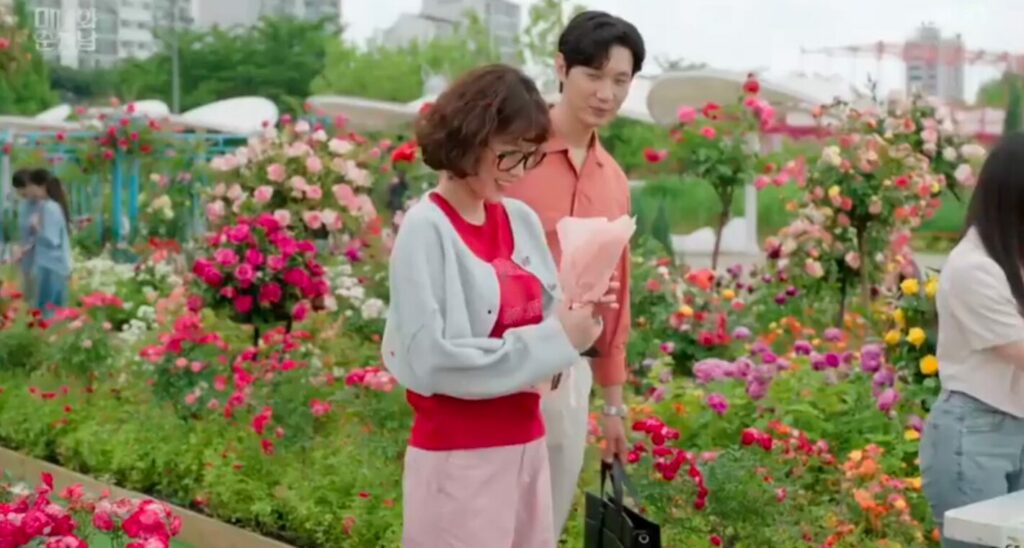
In doing so, it is repudiating both the classic romcom tropes and the underpinning social mores of a fairy tale like Beauty and the Beast with its emphasis on familial piety and self-abnegation. Only by being freed of all these traditional weights will Do-ra and the other women in the show finally be able to be happy.
And if that’s not subversive, I don’t know what is.
The Back Half or How I Could Be Wrong About Everything
There’s another potential interpretation of Beauty and Mr Romantic and, depending how the back half unfolds, it could mean I’m once again seeing something in a drama that simply isn’t there. If you look at especially the Disney films, there is a greater emphasis on the fact that the Beast is secretly a Prince. In this reading, Beauty falls for somebody that society believes is not a viable romantic prospect and is rewarded when his noble birth is revealed.
If we look at the drama from this angle, it could be argued that Pil-sung is the textual “Beast” in that he is a commoner and not a Princely Chaebol. Except of course he secretly is. It is possible that the drama does indeed see Pil-sung as the textual Beast who transforms into a Prince when his noble birth is revealed. And if that is how the drama chooses to play the second half, well, I will not only be wrong but I will be very disappointed.
Because instead of subverting all those tropes, it will simply be reinforcing them. By choosing to love the Beast, the poor girl got herself a Prince as a reward. And not figuratively, as it now stands (because Pil-sung is already a total sweetheart). But literally. And that just undermines the whole message… that I, admittedly, may be constructing out of nothing.
To make it clearer, it’s not the textual fact that Pil-sung is a Chaebol that I’m nervous about here. It’s the idea that this may be framed as a reward for Do-ra persisting in her commitment to the ordinary man she loves over the Chaebol she could marry for money. Once again, Do-ra will be rewarded for her humble nobility with a wealthy Prince. And that would obviously reinforce rather than subvert the tropes this post is discussing.
For now, I guess I’ll just have to wait and see.
Beauty and Mr Romantic is available with full English subtitles on Viki
